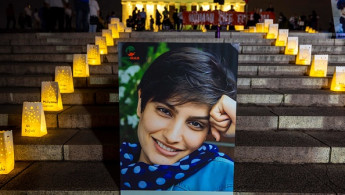Iranian journalists temporarily released face new legal case for flouting hijab
Iran's judiciary has opened a new case against two jailed female journalists for appearing without a hijab upon their temporary release from prison, the judiciary's Mizan news agency reported on Monday.
Niloofar Hamedi and Elaheh Mohammadi, respectively sentenced to 13 and 12 years in prison for their coverage of the death in custody of Kurdish-Iranian Mahsa Amini in 2022, were released on Sunday temporarily after paying bail.
"After footage of the defendants without hijab was released online, a new case has been filed against them," Mizan said referring to a video widely shared on social media showing the two women celebrating their release with family outdoors.
The death of Amini after she was held by the morality police for allegedly violating Iran's strict dress code, triggered months of nationwide anti-government protests, in one of the boldest challenges to the country's clerical leaders in decades.
Mahsa Amini, a 22-year-old Iranian Kurd, had been arrested for an alleged breach of strict dress rules for women.
Images of the two journalists smiling and holding hands outside the prison circulated on social media following their release.
The judiciary's Mizan Online website noted the photos showed "the women without hijab", which has been made obligatory for women in public spaces since shortly after Iran's 1979 Islamic revolution.
Mizan said "a new case was filed against the defendants" as a result.
We were so relieved by journalists Niloofar Hamedi and Elaheh Mohammadi’s release from Iran’s Evin prison yesterday. But this temporary measure is not enough, and the new hijab case opened against them is worrying. @RSF_inter will keep campaigning for their unconditional release. pic.twitter.com/rnaA1LKD7v
— Rebecca Vincent (@rebecca_vincent) January 15, 2024
The terms of the journalists' release on bail bar them from travelling abroad, Mizan said on Sunday.
In October, the judiciary said they had been found guilty of collaboration with Iran's arch enemy the United States, conspiring against state security and "propaganda" against the Islamic republic.
Mohammadi, 36, was subsequently given six years in prison and Hamedi, 31, was handed a seven-year term for the collaboration offence, said Mizan at the time.
The two also received five-year sentences each for the conspiracy charges and one year for propaganda, said Mizan, adding the sentences would be served concurrently.
The two have since appealed their sentences and Tasnim news agency has said they "will remain out of jail until the appeals court makes a decision".
Hamedi was arrested less than a week after Amini's death, when she went to the hospital where Amini was being treated and posted a photo of the grieving family on social media.
Mohammadi was detained after going to Amini's hometown of Saqez, in the western Iranian province of Kurdistan, to cover her funeral which turned into a demonstration.
In August, Iranian media reported that authorities had questioned or arrested more than 90 journalists since the protests triggered by Amini's death erupted across the country.
Hundreds of people, including dozens of security personnel, were killed in the unrest and thousands of demonstrators were arrested, accused by the authorities of taking part in "riots" fomented by the West.





 Follow the Middle East's top stories in English at The New Arab on Google News
Follow the Middle East's top stories in English at The New Arab on Google News


